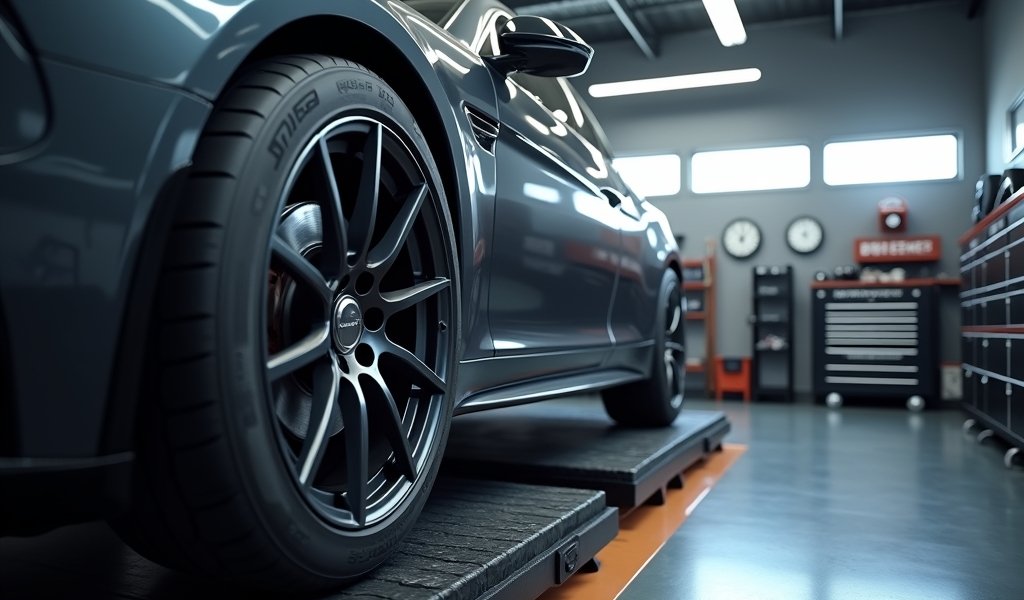Overview
This article evaluates seven top tire brands (Michelin, Continental, Bridgestone, Goodyear, Pirelli, Yokohama, and Hankook), highlighting their unique strengths from premium performance to value options while explaining how factors like tread design, rubber compounds, and driving conditions should guide purchasing decisions. The guide emphasizes that proper tire selection and maintenance are critical safety investments, with specific recommendations for different driving needs and practical tips for extending tire lifespan.
Table of Contents
- Understanding the Importance of Quality Tires
- Key Factors to Consider When Choosing Tire Brands
- Michelin: Premium Performance and Longevity
- Continental: German Engineering for Superior Grip
- Bridgestone: Balanced Performance in All Conditions
- Goodyear: American Innovation in Tire Technology
- Pirelli: Performance-Oriented Tires with Italian Flair
- Yokohama: Japanese Precision and Value
- Hankook: Affordable Quality for Everyday Driving
- Tire Maintenance Tips for Extended Lifespan
- Conclusion: Making Your Final Tire Decision
- Frequently Asked Questions
Understanding the Importance of Quality Tires
When it comes to vehicle safety, few components matter more than the best tire brands for cars that connect you to the road. As a mechanic with over 15 years of experience, I’ve seen firsthand how quality tires can be the difference between a near-miss and a costly accident. Think about it – those four rubber contact patches, each about the size of your palm, are all that stand between your vehicle and the asphalt at highway speeds.
Choosing the right tires isn’t just about finding something round and black to bolt onto your wheels. It’s about understanding how different brands engineer their products to handle specific driving conditions, vehicle types, and performance needs. The best tire brands for cars consistently deliver superior grip, responsive handling, and reliable braking distances – all while providing reasonable tread life and fuel efficiency.
In my garage, I’ve installed thousands of tires from dozens of manufacturers. Through this experience, I’ve identified seven tire brands that consistently outperform the competition in safety tests, customer satisfaction, and real-world performance. These aren’t just marketing claims – these are observations from someone who deals with the consequences of poor tire choices every day.
Before diving into specific brands, let’s establish what makes a great tire. After all, choosing the right tires for your specific vehicle requires understanding the fundamentals of tire performance and design.
Key Factors to Consider When Choosing Tire Brands
Shopping for tires can feel overwhelming with countless options available. As a professional, I recommend focusing on these critical factors when evaluating the best tire brands for cars:
- Tread Design: Different patterns optimize for specific conditions like wet roads, snow, or dry performance
- Rubber Compound: The chemical makeup determines grip level, temperature resistance, and wear characteristics
- Construction Methods: How the tire is built affects its durability, ride quality, and handling precision
- Noise Level: Some designs create more road noise than others, affecting cabin comfort
- Treadwear Rating: Higher numbers indicate longer expected lifespan
- Temperature and Traction Ratings: These alphabetical ratings (A, B, C) indicate heat resistance and grip capability
When evaluating tires, consider your typical driving conditions. Do you face frequent rain or snow? Do you prioritize quiet comfort for long highway trips, or responsive handling for winding back roads? Your driving environment should heavily influence your choice among the best tire brands for cars.
According to NHTSA research on tire safety, proper tire selection can significantly reduce accident risk in adverse conditions. The right tires don’t just perform better – they could save your life during an emergency maneuver or sudden stop.
Now let’s examine seven tire manufacturers that consistently deliver exceptional products worthy of your consideration.

Michelin: Premium Performance and Longevity
Michelin stands atop the tire industry for good reason. Their unwavering commitment to research and development has produced some of the most technologically advanced tires on the market. From my experience working with countless Michelin tires, their standout characteristic is exceptional tread life combined with consistent performance throughout that lifespan.
The Michelin Defender series represents the brand’s approach perfectly. These tires offer remarkable longevity (often 70,000+ miles of tread life) while maintaining wet braking performance even as they wear. This is no small feat – most competing tires sacrifice wet grip as their tread depth diminishes, but Michelin’s advanced rubber compounds resist this degradation.
For performance-oriented drivers, the Michelin Pilot Sport lineup delivers extraordinary grip without the rapid wear typically associated with high-performance tires. I’ve had customers genuinely surprised at how these tires can handle both spirited weekend driving and daily commuting without quickly turning to slicks.
Where Michelin truly separates itself from other best tire brands for cars is their total-package approach. Their tires typically offer:
- Lower rolling resistance (improving fuel economy)
- Reduced road noise (enhancing comfort)
- Exceptional wet and dry braking distances
- Progressive handling that communicates grip limits clearly
The downside? Michelin commands premium pricing – often 15-30% higher than mid-tier competitors. However, when factoring in their longer tread life and the performance benefits, many of my customers find them to be the better value over the long term. As the saying goes in my shop, “You can pay now for quality tires, or pay later for repairs after an accident.”
Continental: German Engineering for Superior Grip
Continental tires exemplify German engineering principles: precise, methodical, and exceptionally effective. Where Continental truly shines is in wet-weather performance, which I consider critically important when recommending the best tire brands for cars to my clients. Their tread designs feature sophisticated water evacuation channels that maintain contact with the road surface even in heavy downpours.
The Continental ExtremeContact DWS06 (DWS standing for Dry, Wet, Snow) represents the brand’s versatility perfectly. This tire performs admirably across varied conditions that would leave other all-season tires struggling. The proprietary “Traction Grooves” technology employs tiny slits in the tread blocks that open as the tire wears, maintaining wet grip throughout the tire’s life.
I’ve installed many sets of Continental’s PureContact series for customers seeking a balance of comfort and performance. The feedback is consistently positive regarding road noise (or lack thereof) and smooth ride quality. Continental has mastered the art of creating tires that disappear beneath you – they simply do their job without calling attention to themselves.
What impresses me most about Continental is their commitment to safety innovations. They were early pioneers in tire pressure monitoring systems and continue to develop technologies like ContiSeal (self-sealing punctures) and ContiSilent (foam layer reducing cabin noise). According to independent testing from Tire Rack, Continental tires consistently rank among the top performers in wet braking tests – often the most critical safety metric.
Continental prices position them in the upper-mid tier – not quite as expensive as Michelin, but definitely commanding a premium over budget brands. For drivers who prioritize all-weather confidence without the highest price tag, Continental represents an excellent value proposition.
Bridgestone: Balanced Performance in All Conditions
Bridgestone has earned its place among the best tire brands for cars through decades of consistent innovation and quality manufacturing. As Japan’s largest tire company, they bring meticulous attention to detail to every product line. What makes Bridgestone special, in my professional experience, is their ability to create tires that excel across multiple performance categories without major compromises.
The Bridgestone Turanza line exemplifies this balanced approach. These touring tires deliver remarkable wet traction, comfortable ride quality, and impressive tread life. I’ve had numerous customers express surprise at how transformative these tires can be when upgrading from budget options – particularly in terms of reduced road noise and improved stability during highway lane changes.
For drivers facing winter conditions, Bridgestone’s Blizzak series has achieved legendary status among mechanics and drivers alike. The specialized multicell compound actually attracts water from snow and ice, then channels it away from the contact patch. The result is winter grip that borders on miraculous compared to all-season alternatives. I’ve had customers who were planning to garage their vehicles for winter change their minds after experiencing Blizzaks.
Bridgestone has also committed heavily to environmental sustainability, developing tires with reduced rolling resistance that improve fuel economy. Their Ecopia line demonstrates that eco-friendly design doesn’t require sacrificing performance. Many hybrid and electric vehicle manufacturers choose Bridgestone as original equipment precisely because of this efficiency focus.
In terms of pricing, Bridgestone typically falls in line with Continental – premium but not quite reaching Michelin’s top-tier pricing. For drivers seeking an excellent all-around performer from one of the best tire brands for cars, Bridgestone consistently delivers value through balanced performance across all metrics.

Goodyear: American Innovation in Tire Technology
Goodyear’s storied American heritage combines with cutting-edge technology to create tires that excel in everyday driving conditions. What sets Goodyear apart among the best tire brands for cars is their focus on practical innovations that solve real-world problems drivers face. Their Weather Reactive Technology, for example, features tread compounds that actually adapt to changing temperatures and road conditions.
The Goodyear Assurance WeatherReady exemplifies this approach perfectly. These tires feature evolving traction grooves that gradually reveal new gripping edges as the tire wears, maintaining wet-weather capability throughout their lifespan. I’ve recommended these to countless customers who drive in varied conditions, and the feedback has been overwhelmingly positive – especially regarding their confidence-inspiring performance during sudden rainstorms.
For performance-oriented drivers, Goodyear’s Eagle series delivers impressive handling precision without punishing ride quality. The Eagle F1 Asymmetric models in particular offer near-sports-car handling with reasonable tread life, making them suitable for enthusiastic daily driving. Their ActiveBraking Technology increases surface contact under hard braking, noticeably shortening stopping distances.
I’ve noticed Goodyear excels particularly at creating tires that perform well in the American driving context – they handle our typically wider roads, higher highway speeds, and varied climate conditions exceptionally well. They’ve clearly designed their products with North American driving habits in mind.
Goodyear typically prices their premium offerings comparable to Continental and Bridgestone – solidly in the upper-mid tier of the market. Their frequent promotions and rebates, however, often make them more accessible than other premium brands. For drivers seeking American-engineered tires with excellent all-around capabilities, Goodyear remains one of the ultimate choices when selecting tires for your vehicle.
Pirelli: Performance-Oriented Tires with Italian Flair
Pirelli’s Italian heritage shines through in tires that blend performance, technology, and a certain stylish flair. Among the best tire brands for cars, Pirelli stands out for their focus on delivering exceptional handling characteristics and road feel. Their connection to motorsports, including being the exclusive Formula 1 tire supplier, translates to street tires that emphasize precision and feedback.
The Pirelli P Zero family represents the pinnacle of their performance technology. These tires deliver extraordinary grip in both wet and dry conditions, with steering response that feels almost telepathic. I’ve installed these on everything from sports sedans to luxury SUVs, and drivers consistently report a transformed driving experience – the vehicle simply feels more connected to the road.
What impresses me most about Pirelli’s approach is their specialization in creating tires specifically engineered for particular vehicles. Their “homologation” program develops bespoke versions for specific car models, marked with special codes like “AO” for Audi or “MO” for Mercedes-Benz. These aren’t just marketing gimmicks – they feature subtle but meaningful adjustments to complement each vehicle’s suspension geometry and handling characteristics.
The Pirelli Cinturato P7 deserves special mention for daily drivers seeking a more performance-oriented experience without sacrificing comfort. These tires deliver nimble handling while reducing road noise and providing reasonable tread life – a difficult balance that Pirelli manages beautifully.
Pirelli tends to command premium pricing similar to Michelin, reflecting their performance focus and brand prestige. For drivers who prioritize handling precision and are willing to trade some tread life for superior performance feel, Pirelli offers compelling options that enhance the driving experience.
Yokohama: Japanese Precision and Value
Yokohama represents Japanese engineering excellence combined with surprising value. Among the best tire brands for cars, Yokohama stands out for delivering premium-adjacent performance at more accessible price points. Their technical approach emphasizes advanced tread designs and compounds that maximize performance without requiring the most expensive manufacturing techniques.
The Yokohama ADVAN series demonstrates their performance capabilities beautifully. These tires deliver precise handling and excellent grip while typically costing 10-15% less than comparable offerings from Michelin or Pirelli. In my shop, I’ve recommended these to enthusiast drivers operating on tighter budgets, and they’re consistently impressed by the performance-per-dollar ratio.
For everyday drivers, the Yokohama Avid Ascend GT offers an impressive combination of comfort, tread life, and all-season capability. The specialized TriBLEND compound technology delivers extended tread life while maintaining wet grip as the tire wears – addressing a common weakness in mid-tier tires. Customer feedback on these has been overwhelmingly positive, particularly regarding their quiet operation and fuel efficiency.
Yokohama’s environmental focus also deserves mention. Their BluEarth series utilizes orange oil compounds that reduce petroleum use in manufacturing while enhancing grip in wet conditions. This innovation represents Yokohama’s thoughtful approach to sustainability without sacrificing performance.
For drivers seeking impressive performance, reasonable longevity, and lower cost than the ultra-premium brands, Yokohama consistently delivers excellent value. Their position in the market makes them particularly appealing to informed consumers who recognize that the highest price doesn’t always indicate the best performance for their specific needs.
Hankook: Affordable Quality for Everyday Driving
Hankook has risen rapidly through the tire industry ranks by delivering surprisingly capable tires at value-oriented price points. Among the best tire brands for cars, Hankook occupies an important position – bringing near-premium performance to the mid-tier price range. Their manufacturing efficiency and growing technical expertise have created a compelling alternative to higher-priced competitors.
The Hankook Ventus line showcases their performance capabilities impressively. These tires offer responsive handling, good wet traction, and reasonable tread life while typically costing 20-30% less than comparable premium offerings. I’ve installed many sets on sports sedans and hot hatchbacks, with drivers consistently surprised by how well they perform relative to their cost.
For mainstream drivers, the Hankook Kinergy GT provides an excellent balance of comfort, noise control, and all-season capability. The specialized silica compound delivers impressive wet grip without sacrificing tread life – addressing a typical weakness in value-oriented tires. Many customers report these tires feeling nearly indistinguishable from much more expensive alternatives in daily driving.
What impresses me most about Hankook’s approach is their rapid innovation cycle. They continuously refine their designs and compounds, with each generation showing measurable improvements in key performance metrics. This aggressive development pace has steadily narrowed the gap between Hankook and premium brands.
Hankook typically prices their products 15-25% below premium alternatives while delivering 90-95% of the performance in most everyday driving situations. This value proposition makes them particularly appealing to practical drivers who prioritize smart spending without compromising on fundamental safety and performance characteristics.
Tire Maintenance Tips for Extended Lifespan
Even the best tire brands for cars require proper maintenance to deliver their full potential in safety and longevity. As a mechanic, I’ve seen how simple maintenance habits can double tire lifespan – or how neglect can cut it in half. Here are my essential tips for getting the most from your tire investment:
- Check Pressure Monthly: Underinflation accelerates wear and reduces fuel economy
- Rotate Every 5,000-7,000 Miles: This ensures even wear across all four tires
- Maintain Proper Alignment: Misalignment causes rapid, uneven wear patterns
- Inspect Regularly: Look for cuts, bulges, or objects embedded in the tread
- Monitor Tread Depth: Replace tires when tread reaches 4/32″ (or earlier for winter driving)
- Balance When Needed: Vibrations at certain speeds indicate balancing issues
Temperature significantly impacts tire pressure – expect roughly 1 PSI change for every 10°F temperature swing. This means tires that were properly inflated during summer might be dangerously underinflated during winter. I recommend checking pressure when tires are cold for the most accurate readings.
Pay attention to how your vehicle feels. Pulling to one side, vibrations, or unusual noises often indicate tire issues that need addressing. Early intervention can often save a tire that would otherwise need replacement.
According to research from Consumer Reports on tire longevity, proper rotation and inflation can extend tire life by up to 50%. That’s thousands of miles of additional safe driving from a few simple maintenance habits.
Remember that even the best tire brands for cars have limited lifespan. Most experts recommend replacing tires every 6 years regardless of tread depth, as rubber compounds deteriorate with age, reducing safety.
Conclusion: Making Your Final Tire Decision
Selecting from among the best tire brands for cars ultimately comes down to understanding your specific needs, driving conditions, and budget constraints. Each of the seven brands we’ve explored offers distinct advantages while maintaining strong safety fundamentals. As a mechanic, I can confidently say that any of these manufacturers produce tires that will serve you well when properly selected and maintained.
If maximum performance and longevity are your priorities regardless of cost, Michelin offers unmatched total package excellence. For drivers seeking exceptional wet-weather capability, Continental delivers class-leading technology. Those facing varied weather conditions will appreciate Bridgestone’s balanced approach. American drivers often connect well with Goodyear’s practical innovations.
For enthusiast drivers, Pirelli’s handling precision and road feel create a more engaging experience. Value-conscious consumers should seriously consider Yokohama’s impressive performance-per-dollar ratio. And those seeking solid everyday performance on a tighter budget will find Hankook offers remarkable capability at accessible price points.
Remember that the best tire for your vehicle isn’t necessarily the most expensive one – it’s the one that best matches your driving environment, vehicle characteristics, and personal priorities. Consult with a trusted mechanic or tire specialist who can help translate these brand characteristics into specific recommendations for your unique situation.
Ultimately, quality tires represent one of the most important safety investments you can make in your vehicle. By selecting from these proven best tire brands for cars and maintaining them properly, you’re taking a significant step toward protecting yourself and your passengers while enhancing your overall driving experience.
Frequently Asked Questions
How often should I replace my tires even if they look fine?
Most manufacturers recommend replacing tires every 6 years regardless of appearance due to rubber compound degradation. Check the four-digit DOT code on your sidewall to determine manufacturing date.
Are more expensive tire brands always better?
Not necessarily – premium brands often offer better performance and longevity, but mid-tier brands can provide excellent value for typical driving. Your specific needs and driving conditions should guide your decision more than price alone.
Should I get the same tires that came with my car originally?
Original equipment (OE) tires are specifically designed for your vehicle, making them a safe choice. However, aftermarket options may offer improvements in specific areas like wet traction, quietness, or longevity depending on your priorities.
What’s more important: tire brand or tire model?
Tire model is typically more important as performance varies significantly between models even within the same brand. A mid-range model from a premium brand might perform worse than a flagship model from a value brand for your specific needs.
Is it OK to mix different tire brands on my car?
Ideally, you should use the same brand, model, and size on all four wheels for consistent handling characteristics. At minimum, keep identical tires on each axle (front pair matching, rear pair matching) for predictable behavior.


Pingback: Best tire brands for cars: 7 top picks - knowsyourcar.com